高考英语二轮专题复习:定语从句 课件(18张PPT)
文档属性
| 名称 | 高考英语二轮专题复习:定语从句 课件(18张PPT) |
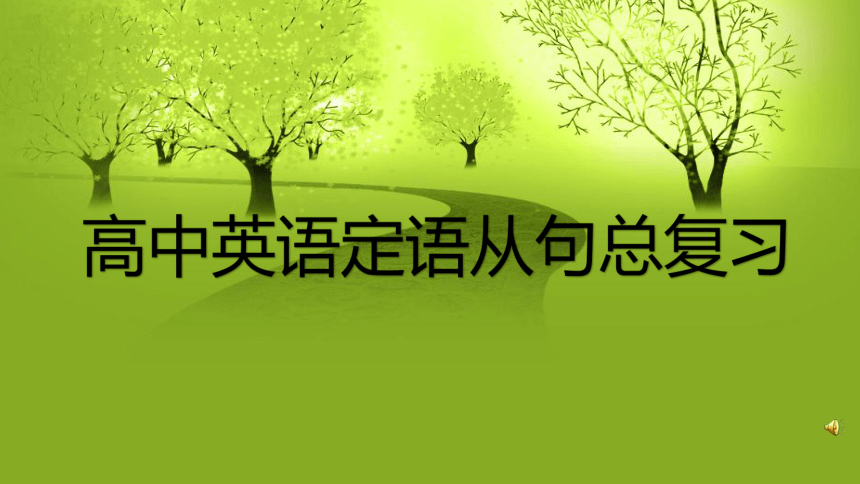
|
|
| 格式 | zip | ||
| 文件大小 | 2.4MB | ||
| 资源类型 | 教案 | ||
| 版本资源 | 通用版 | ||
| 科目 | 英语 | ||
| 更新时间 | 2020-05-15 00:00:00 | ||
图片预览

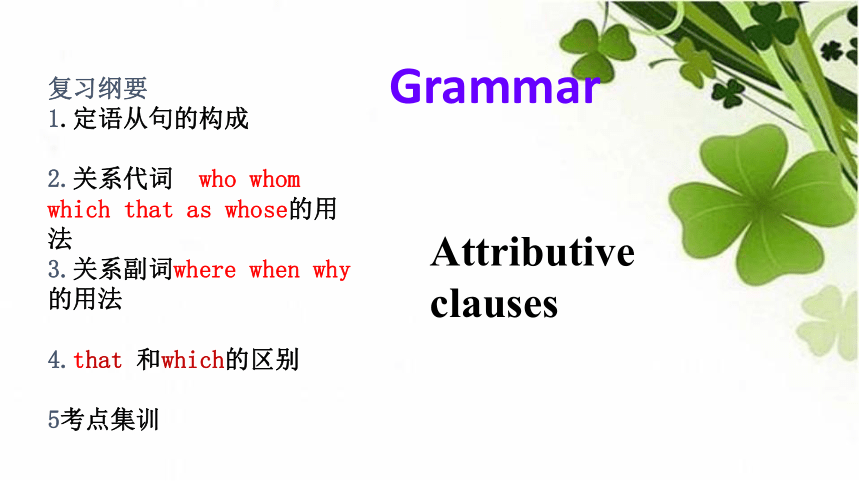
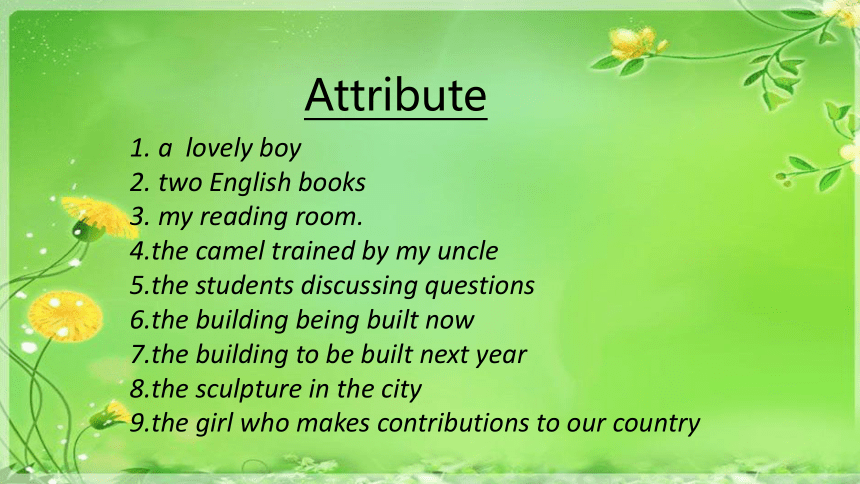
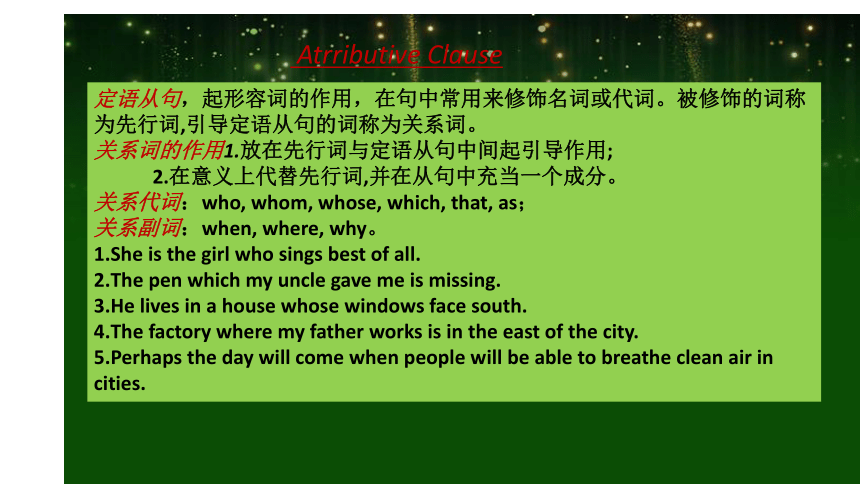
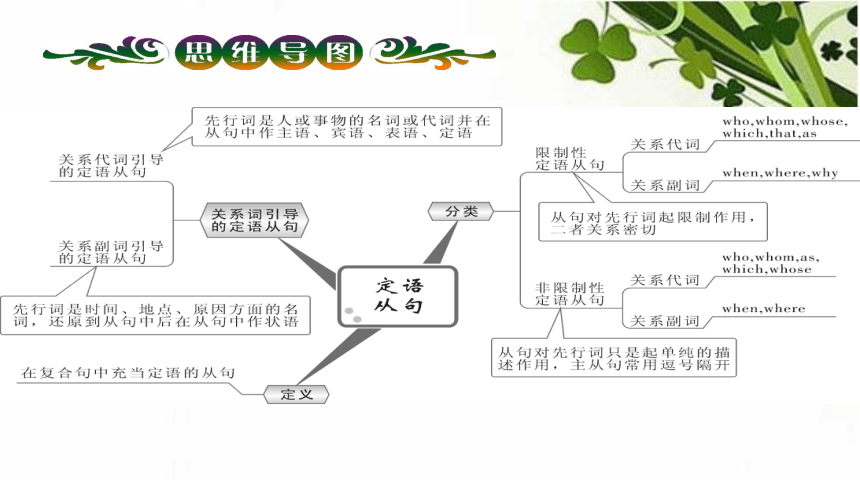
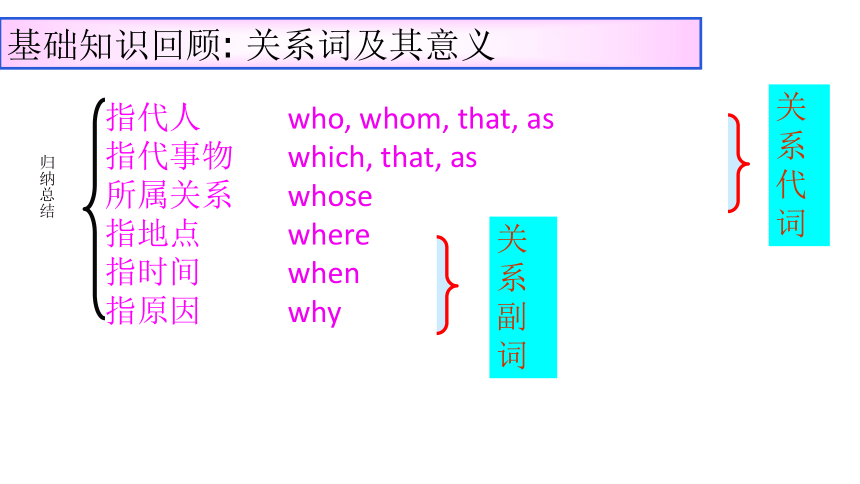

文档简介
(共18张PPT)
高中英语定语从句总复习
Grammar
Attributive clauses
复习纲要
1.定语从句的构成
2.关系代词 who whom which that as whose的用法
3.关系副词where when why 的用法
4.that 和which的区别
5考点集训
Attribute
1. a lovely boy
2. two English books
3. my reading room.
4.the camel trained by my uncle
5.the students discussing questions
6.the building being built now
7.the building to be built next year
8.the sculpture in the city
9.the girl who makes contributions to our country
定语从句,起形容词的作用,在句中常用来修饰名词或代词。被修饰的词称为先行词,引导定语从句的词称为关系词。
关系词的作用1.放在先行词与定语从句中间起引导作用;
2.在意义上代替先行词,并在从句中充当一个成分。
关系代词:who, whom, whose, which, that, as;
关系副词:when, where, why。
1.She is the girl who sings best of all.
2.The pen which my uncle gave me is missing.
3.He lives in a house whose windows face south.
4.The factory where my father works is in the east of the city.
5.Perhaps the day will come when people will be able to breathe clean air in cities.
Atrributive Clause
基础知识回顾: 关系词及其意义
指代人
指代事物
所属关系
指地点
指时间
指原因
who, whom, that, as
which, that, as
whose
where
when
why
关系代词
关系副词
归纳总结
关系代词的用法
1.?先行词是人,作主语,关系代词用who, that
?eg. He is a man(?????) never leaves today’s work till tomorrow.
???? The boy (????? ) is standing there is my cousin.
2. 先行词是人,作宾语,关系代词用 whom, who, that,也可省略。
eg.? Here is the man (?????????? ) you’ve been expecting to meet.
The man (??????? ) you met yesterday is Mr. Smith.
3. 先行词是物,作主语,关系代词用which, that
eg .? The train (????? ) has? just? left? is? for? Guangzhou.
Children like to read books (?????? ) have wonderful pictures.
4. 先行词是物,作宾语,关系代词用which, that,或省略
eg.? The book (?????? ) you borrowed yesterday is really interesting.
The pen (??????? ) my uncle gave me is missing.
5. 先行词是人、物,作定语,关系代词用whose
eg.? He is the professor (?????? ) name was Jackson.
China, (???? ) population is the largest in the world, is developing very fast.
关系副词的用法
1.?先行词是表示时间的名词,在定从中作时间状语,关系代词用when
?eg.? I can’t remember the date (????? ) he went abroad.
I’ll never forget the day (????? ) I joined the army.
2.?先行词是表示地点的名词,在定从中作地点状语,关系代词用where; 其中注意表示抽象概念的地点名词,如,situation、stage、degree、point等表示方面或程度时,也需用where
eg.? This is the village (???? ) Uncle Wang once lived.
They have reached the point (????? ) they have to separate with each other.
He’s got himself into a dangerous situation (?????? ) he is likely to lose control over the plane.
?3. 先行词是reason,在定从中作原因状语,关系代词用why 等同于for which
eg.? I don’t know the reason (???? ) he was late.
None of us know the reason (??????? ) Tom was absent from the meeting.
4.引导定语从句的关系副词也可以用“适当介词 + which”来代替。
eg.? October 1, 1949 was the day when ( =????? ) the People’s Republic of China was founded.
This is the factory where(=???????? ) we worked a year ago.
I don’t believe the reason why (=??????? ) he was late for school.
1. The teachers are present at our class
are all experienced teachers.
2. Our class is a big family consists of 33 girls and 9 boys.
3. Yun Feng is the girl English study is very good in our class.
4. The school we are studying is very famous.
5. we all know, our school is more than 60 years old.
where
who
whose
As
which
基础知识练习:
只用that的情况:
① 先行词为all, everything, anything, nothing, little, much等不定代词时。
eg.? There is nothing (????? ) can prevent him from doing it.
② 先行词被any, only, few, no, very, little 等修饰时。
eg.? This is the very book (????? ) I’m looking for.
③ 先行词被形容词最高级或序数词修饰时。
eg.? The first place (??? ) they visited in Guilin was Elephant Trunk Hill.
This is the best film (???? ) I have ever seen.
④ 先行词既有人又有物时。
eg.? He talked about things and persons (???? ) they remembered in the school.
⑤ 先行词被the only, the very修饰时。
eg.? Mr. Smith is the only foreigner (????? ) he knows.
⑥ 句中已有who或which,为了避免重复时。
eg.? Who is the man (???? ) is standing beside Tom?
不用that的情况:
① 引导非限制性定语从句;
eg.? He had failed in the maths exam , (??? ) made his father very angry.
② 介词 + 关系代词。
eg.? This is the room in(???? ) my father lived last year.
Ⅴ. as引导定语从句时的用法
① as引导限制性定语从句通常用于the same … as, such … as结构中。
eg.? This is the same book (???? ) I lent you.
Such machines (???? ) are used in our workshop are made in China.?
② as引导非限制性定语从句既可放在主句之前,也可放在主句之后,位置灵活,用来修饰整个句子。通常用下列句型:as is known to all, as is said, as is reported, as is announced, as we all know, as I expect 等。
eg.? (???? ) I expected, he got the first place again in this mid-term examination.
Taiwan, (????? ) we all know, belongs to China.
分隔定语从句
即先行词与关系代词、副词之间被介词短语,同位语,谓语等分隔开来。
此种定语从句,在选择关系词时,要注意找准先行词。
eg.? There is an expression in his eyes (???? )I can’t understand.
I was the only person in my office (???? ) was invited to the important ball.
I suggest you choose someone I think (????? ) is very kind and friendly.
概念拓展:
同位语从句与定语从句的区别
That引导定语从句时充当句子成分,同位语从句时不充当句子成分。用when ,where ,why引导同位语从句时,其前面的词不是相应的时间,地点、原因,而定语从句则必须是相应的时间、地点、原因。例如:
The suggestion that the job is unfit for you is reasonable.
The suggestion that you put forward is reasonable.
1) a. It is in this room ______I lived last year.
b. It is the room _______I lived last year.
2) a. It was at seven o’clock ______he went to
school this morning.
b. It was seven o’clock _______he went
to school this morning.
解题点拨:强调句型:It is/was+被强调的成份+that/who+其它部分; 去掉 It is/was….that/who… ,句子照样成立;而定语从句的引导词在句中要作成份。
that
where
that
when
定语从句与强调 句
conclusion
先行词充当主、宾、表或定语,则用关系代词
先行词充当状语,则用关系副词
that , who , whom , which , as ,
whose
where , when , why
Homework
Write an article with the title “My English Teacher” in 5 sentences, using attributive clause.
美文欣赏
Don’t forget the things that once you owned . Treasure the things that you can’t get . Don’t give up the things that belong to you and keep those lost things in memory.
曾经拥有的,不要忘记。不能得到的,更要珍惜。属于自己的,不要放弃。已经失去的,留作回忆。
高中英语定语从句总复习
Grammar
Attributive clauses
复习纲要
1.定语从句的构成
2.关系代词 who whom which that as whose的用法
3.关系副词where when why 的用法
4.that 和which的区别
5考点集训
Attribute
1. a lovely boy
2. two English books
3. my reading room.
4.the camel trained by my uncle
5.the students discussing questions
6.the building being built now
7.the building to be built next year
8.the sculpture in the city
9.the girl who makes contributions to our country
定语从句,起形容词的作用,在句中常用来修饰名词或代词。被修饰的词称为先行词,引导定语从句的词称为关系词。
关系词的作用1.放在先行词与定语从句中间起引导作用;
2.在意义上代替先行词,并在从句中充当一个成分。
关系代词:who, whom, whose, which, that, as;
关系副词:when, where, why。
1.She is the girl who sings best of all.
2.The pen which my uncle gave me is missing.
3.He lives in a house whose windows face south.
4.The factory where my father works is in the east of the city.
5.Perhaps the day will come when people will be able to breathe clean air in cities.
Atrributive Clause
基础知识回顾: 关系词及其意义
指代人
指代事物
所属关系
指地点
指时间
指原因
who, whom, that, as
which, that, as
whose
where
when
why
关系代词
关系副词
归纳总结
关系代词的用法
1.?先行词是人,作主语,关系代词用who, that
?eg. He is a man(?????) never leaves today’s work till tomorrow.
???? The boy (????? ) is standing there is my cousin.
2. 先行词是人,作宾语,关系代词用 whom, who, that,也可省略。
eg.? Here is the man (?????????? ) you’ve been expecting to meet.
The man (??????? ) you met yesterday is Mr. Smith.
3. 先行词是物,作主语,关系代词用which, that
eg .? The train (????? ) has? just? left? is? for? Guangzhou.
Children like to read books (?????? ) have wonderful pictures.
4. 先行词是物,作宾语,关系代词用which, that,或省略
eg.? The book (?????? ) you borrowed yesterday is really interesting.
The pen (??????? ) my uncle gave me is missing.
5. 先行词是人、物,作定语,关系代词用whose
eg.? He is the professor (?????? ) name was Jackson.
China, (???? ) population is the largest in the world, is developing very fast.
关系副词的用法
1.?先行词是表示时间的名词,在定从中作时间状语,关系代词用when
?eg.? I can’t remember the date (????? ) he went abroad.
I’ll never forget the day (????? ) I joined the army.
2.?先行词是表示地点的名词,在定从中作地点状语,关系代词用where; 其中注意表示抽象概念的地点名词,如,situation、stage、degree、point等表示方面或程度时,也需用where
eg.? This is the village (???? ) Uncle Wang once lived.
They have reached the point (????? ) they have to separate with each other.
He’s got himself into a dangerous situation (?????? ) he is likely to lose control over the plane.
?3. 先行词是reason,在定从中作原因状语,关系代词用why 等同于for which
eg.? I don’t know the reason (???? ) he was late.
None of us know the reason (??????? ) Tom was absent from the meeting.
4.引导定语从句的关系副词也可以用“适当介词 + which”来代替。
eg.? October 1, 1949 was the day when ( =????? ) the People’s Republic of China was founded.
This is the factory where(=???????? ) we worked a year ago.
I don’t believe the reason why (=??????? ) he was late for school.
1. The teachers are present at our class
are all experienced teachers.
2. Our class is a big family consists of 33 girls and 9 boys.
3. Yun Feng is the girl English study is very good in our class.
4. The school we are studying is very famous.
5. we all know, our school is more than 60 years old.
where
who
whose
As
which
基础知识练习:
只用that的情况:
① 先行词为all, everything, anything, nothing, little, much等不定代词时。
eg.? There is nothing (????? ) can prevent him from doing it.
② 先行词被any, only, few, no, very, little 等修饰时。
eg.? This is the very book (????? ) I’m looking for.
③ 先行词被形容词最高级或序数词修饰时。
eg.? The first place (??? ) they visited in Guilin was Elephant Trunk Hill.
This is the best film (???? ) I have ever seen.
④ 先行词既有人又有物时。
eg.? He talked about things and persons (???? ) they remembered in the school.
⑤ 先行词被the only, the very修饰时。
eg.? Mr. Smith is the only foreigner (????? ) he knows.
⑥ 句中已有who或which,为了避免重复时。
eg.? Who is the man (???? ) is standing beside Tom?
不用that的情况:
① 引导非限制性定语从句;
eg.? He had failed in the maths exam , (??? ) made his father very angry.
② 介词 + 关系代词。
eg.? This is the room in(???? ) my father lived last year.
Ⅴ. as引导定语从句时的用法
① as引导限制性定语从句通常用于the same … as, such … as结构中。
eg.? This is the same book (???? ) I lent you.
Such machines (???? ) are used in our workshop are made in China.?
② as引导非限制性定语从句既可放在主句之前,也可放在主句之后,位置灵活,用来修饰整个句子。通常用下列句型:as is known to all, as is said, as is reported, as is announced, as we all know, as I expect 等。
eg.? (???? ) I expected, he got the first place again in this mid-term examination.
Taiwan, (????? ) we all know, belongs to China.
分隔定语从句
即先行词与关系代词、副词之间被介词短语,同位语,谓语等分隔开来。
此种定语从句,在选择关系词时,要注意找准先行词。
eg.? There is an expression in his eyes (???? )I can’t understand.
I was the only person in my office (???? ) was invited to the important ball.
I suggest you choose someone I think (????? ) is very kind and friendly.
概念拓展:
同位语从句与定语从句的区别
That引导定语从句时充当句子成分,同位语从句时不充当句子成分。用when ,where ,why引导同位语从句时,其前面的词不是相应的时间,地点、原因,而定语从句则必须是相应的时间、地点、原因。例如:
The suggestion that the job is unfit for you is reasonable.
The suggestion that you put forward is reasonable.
1) a. It is in this room ______I lived last year.
b. It is the room _______I lived last year.
2) a. It was at seven o’clock ______he went to
school this morning.
b. It was seven o’clock _______he went
to school this morning.
解题点拨:强调句型:It is/was+被强调的成份+that/who+其它部分; 去掉 It is/was….that/who… ,句子照样成立;而定语从句的引导词在句中要作成份。
that
where
that
when
定语从句与强调 句
conclusion
先行词充当主、宾、表或定语,则用关系代词
先行词充当状语,则用关系副词
that , who , whom , which , as ,
whose
where , when , why
Homework
Write an article with the title “My English Teacher” in 5 sentences, using attributive clause.
美文欣赏
Don’t forget the things that once you owned . Treasure the things that you can’t get . Don’t give up the things that belong to you and keep those lost things in memory.
曾经拥有的,不要忘记。不能得到的,更要珍惜。属于自己的,不要放弃。已经失去的,留作回忆。
